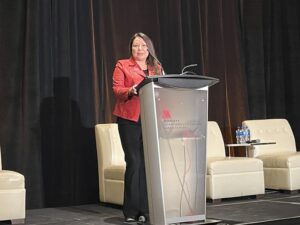Madahbee Leach delivers keynote address at True ReconciliACTION conference

By Sam Laskaris
TORONTO – Dawn Madahbee Leach, one of the most influential Indigenous business leaders in the country, provided the keynote address at a Toronto conference on Jan. 11.
Madahbee Leach, a member of Aundeck Omni Kaning First Nation on Manitoulin Island, delivered her address at the Indian Resource Council (IRC) True ReconciliACTION conference held at the Marriott Downtown in Toronto.
The IRC was founded in 1987 by chiefs representing oil and gas-producing First Nations.
“My work over the years has been all about advocating for Indigenous businesses,” said Madahbee Leach, adding that she was attending the conference serving as the chair of the National Indigenous Economic Development Board.
The board’s mandate is to provide advice and guidance to the federal government on Indigenous economic development matters.
Madahbee Leach said the board will be releasing a new report in a couple of months, but before that, it will unveil an updated copy on the report for economic reconciliation, which demonstrates that if Indigenous peoples had the same education, employment, and income levels as the average person in Canada, they would contribute more than $30 billion annually to Canada’s economy.
“This report shows the specific education, employment, and income targets needed to achieve that level of Indigenous inclusion and contributions to this country,” Madahbee Leach said.
The report will show that in Atlantic Canada, about 4,900 jobs would need to be created for Indigenous people to be on the same levels as other people in the region. And in Ontario, 19,000 jobs would need to be created.
“Those are the kinds of targets that we are looking at to be on par with the rest of Canada,” Madahbee Leach said.
She added these targets are achievable.
“And it’s important to know that studies show, over and over again, that when Indigenous communities prosper, so do the regions around it,” she said. “So, supporting Indigenous economic development helps regional economies.”
Madahbee Leach also spoke about the theme of this year’s conference being True ReconciliACTION.
“Looking at the past, it’s important to understand that of all the devastating effects of colonialism on the social and physical health of our communities, one of its most nefarious objectives was the deliberate exclusion of Indigenous peoples from sharing in the wealth of this country,” she said. “[That’s] wealth generated from the very lands and resources in our traditional territories… Over the past decade alone, Canada has exported more than $300 billion a year, or more than $3 trillion in natural resources from our traditional territories. Our communities did not receive a fraction of this value.”
Madahbee Leach also said proper justice is still not being achieved.
“Looking to the present, First Nations have been winning court cases at Supreme Court for over the past 30 years, which has confirmed that our people have a say in jurisdiction in all developments in our traditional territory,” she said. “Canadian law hasn’t kept up with these legal rulings, which unfortunately, has left many developments in Canada in untenable situations were Indigenous communities are not involved.”
Madahbee Leach said economic reconciliation is critical to Canada’s economy and that a lack of Indigenous consultations on various initiatives can stall projects.
Madahbee Leach believes true reconciliation will be achieved when Indigenous people are included in all decision-making tables of government and in corporate boardrooms.
“True economic reconciliation will be realized when all outstanding land claims are resolved and the legal jurisdiction on our lands and waterways is recognized in law,” she added. “When Indigenous people not only achieve economic parity with the rest of Canada in terms of terms of levels of education, employment, and income as stated in the national Indigenous economic strategy but also when our health indicators, our infrastructure and our housing are at least on par with the rest of Canada.”


